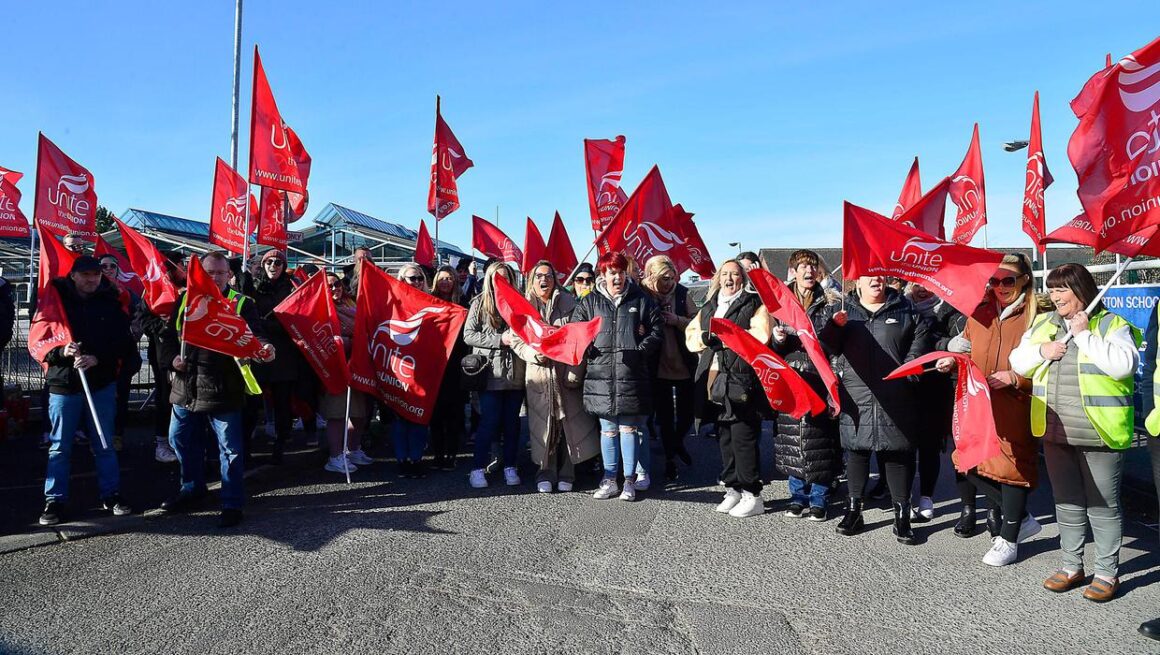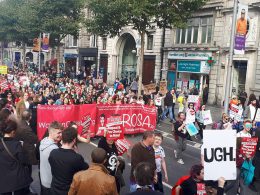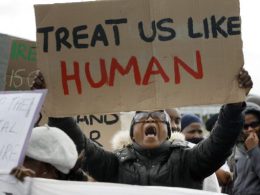Statement by the Socialist Party
Amidst the cost-of-living crisis that has already led to 76% of people in Northern Ireland living in fuel poverty and significant workplace struggles for higher wages, the Stormont crisis is intensifying. Establishment politicians here and their counterparts in the British and Irish governments are increasing the sectarian temperature, with calls for a return to direct rule or ‘joint authority’ involving the Irish government. There have also been deplorable threats of violence by paramilitary forces. There is a risk of a return to paramilitary violence on a scale not seen since the end of the Troubles. Here, we outline the urgent need for a stronger workers’ movement to challenge the dead-end of sectarian politics and paramilitary violence.
As we have explained elsewhere, the demographic changes in the North and a capitalist system facing multiple crises are the main underlying factors for the changed situation. Brexit and the discussions around the NI Protocol are further accelerants, as is the overall economic and political crisis which is displayed, for example, in the ongoing instability in the Tories and Westminster. The capitalist economic crisis is, however, also pushing workers into united struggles for better wages and against attacks on our living standards. Workers across the private manufacturing sector as well as in local authorities, Royal Mail and BT/Openreach have been on strike for better wages. The health and social care sector as well as university workers are due to go on strike in the next weeks also. There have been various protests against the cost-of-living crisis which have united workers. Most recently, a protest initiated by the heroic Regina Coeli workers called on the then minister for communities, Sinn Fein’s Deirdre Hargey, to deliver on her outstanding commitment to provide a women’s hostel.
Partly because the economic crisis is a factor in both phenomena, we are likely to continue to see an ongoing simultaneous increase in both sectarian tensions and workers’ struggle, with a growing realisation that to effectively challenge the cost-of-living crisis, we have to fight together. At some point, one process will, however, overcome the other: Either sectarian violence will knock back the struggles uniting working-class people or common struggle and the regrowth of a fighting, anti-sectarian workers’ movement will cut across and check sectarian polarisation. It is up to the workers’ movement to act urgently to ensure we fight for the latter option. The trade union movement can do this by developing the struggle on the cost-of-living crisis and against oppression in order to actively unite working-class people from Protestant, Catholic and other backgrounds which will in itself provide a counterbalance to increasing tensions and make it more difficult for sectarian forces including paramilitaries, to gain ground. In addition, there is a burning need for a political voice that can unite working-class people and provide an alternative to the sectarian political system.
No return to paramilitary violence!
Pressure is clearly building within loyalist paramilitaries. A recent letter from the Loyalist Community Council, the legal front of the main loyalist paramilitaries groups, warned against any ‘backsliding’ from the Unionist parties on the question of the NI protocol and warned against any Southern government ministers visiting the North. Separately, PUP leader Billy Hutchinson said that anger and tension are higher than at any time since the 1994 loyalist ceasefire.
In recent weeks we have seen threats against prominent figures involved in the debates around Irish unity including against James Nesbitt and Colin Harvey, lecturer at Queen’s University as well as sectarian attacks including incidents of arson on Orange Halls. The reports of a planned attack by loyalist paramilitaries on a Southern government building are the most glaring illustration of this increased threat of violence. That this threat was posed illustrates a huge increase in tensions and potential for actual physical escalation. Significantly, the attack was planned not by fringe or rogue elements in the UVF but after a meeting of “senior loyalists”. In recent years, commentators have reported a new generation joining loyalist paramilitaries. In 2020, for example, a leaked security assessment suggested that loyalist paramilitary groups currently had 12,500 members. Until now, they have been held in check by an older generation that does not want a return to any form of conflict. What is indicated, however, is that this old guard is either no longer capable or no longer willing to hold things back.
In response, the IRSP, the political wing of the INLA, stated that they are “monitoring” loyalist paramilitaries: a clear warning on their part that if loyalist violence escalates they will retaliate. Previously the dissident republican group, Óglaigh na hÉireann, in their Easter commemoration statement, said that they would target loyalist figures in retaliation if loyalists targeted nationalist politicians, at an event where newly-acquired automatic weapons were displayed, the first armed display in Milltown cemetery since the Provisional IRA ceasefire in the 1990s. This shows that if violence does flare up it could quickly lead to retaliation but also would not be contained to the North, instead directly impacting the South and potentially also Britain, as in the past. Alarmingly, in this context of economic and political turmoil, we can already see the potential for some young people, in particular in hard-pressed, working-class communities to once again be dragged into the dead-end of sectarian paramilitarism. We cannot rely on the PSNI or other parts of the state to challenge this. The strengthening of paramilitary organisations in our communities will not only intensify sectarian polarisation but they have the capacity to play a regressive role in every manner. The secretive and unaccountable nature of these forces drives gender violence and domestic abuse. Women and LGBTQI+ people, therefore, have a particular role in building movements that can drive paramilitaries out of working-class areas. In the context of the cost-of-living crisis, the parasitic nature of these organisations can also be seen in how they act as loan sharks. As part of the challenge to the dead-end of sectarianism, it is of paramount importance that the workers’ movement build a collective, strong, consciously anti-sectarian and active movement to oppose not only sectarianism, but also to fight the economic conditions that allow sectarian division to be maintained.
Crisis built on crisis
The ineptitude of Secretary of State for Northern Ireland Chris Heaton-Harris reflects the inability of capitalist politicians to find a way out of the Stormont crisis. Initially adamant he would call an election before the end of the year if the last deadline for restoration was missed, he then made a u-turn reportedly after direct intervention by Rishi Sunak and lobbying by the Irish government. Sunak is the third prime minister in as many months, reflecting a profound crisis facing British capitalism and the Tories which has added to the instability in Northern Ireland. Sunak was the figure in Johnson’s old cabinet most nervous about provoking a trade war with the EU. Against the backdrop of unstable markets and a weak pound, the British government will be even more nervous about exacerbating the situation. While unilateral decisions are still not ruled out, their focus will be on agreeing changes to the protocol fromEU/UK trade negotiations. They have been described as progressing but being mostly concerned with technicalities, rather than addressing the real concerns many have regarding the protocol.
While some have mistakenly argued that the DUP’s Stormont boycott is a ‘manufactured’ crisis, it is rooted in significant discontent within the Protestant community about the NI protocol, which creates a border between Britain and Northern Ireland.80% of Unionist voters support the DUP’s stance of not returning to the Assembly or Executive without significant changes to the protocol. voters go further saying there should be no return to the Executive unless the protocol is fully scrapped. Any fresh election will reflect this polarisation, with opinion polls showing an increase in those intending to vote for the DUP on one hand and Sinn Fein on the other. The DUP boycott is seen among Catholics as being a snub to the idea of nationalist/non-unionist first minister rather than being rooted in concern among Protestants about the Protocol’s impacts. A recent poll found that 67% believe the DUP will take the Deputy First Minister post with Sinn Fein in the First Minister position. This illustrates the depth of the current stalemate.
Direct rule or “joint authority” are no solution
The options of direct rule from Westminster, joint authority (where decisions are taken jointly by the British and Irish government), or some variant of the two are being increasingly discussed. None, however, would be in the interests of working-class people.
It is understandable that some, particularly Catholics, look at the chaos in Westminster and want to see anything that can even ameliorate the Tories’ influence. However, the Irish equivalents of the Tories in Fine Gael and Fianna Fail would offer no protection for workers. Recently, Peter Hain, Secretary of State when direct rule was last imposed, told Nolan Live that we would have something similar to the previous period of direct rule in which the Irish government were “properly consulted on everything very intimately.” In other words, the then Irish government was ‘intimately’ consulted on a whole array of attacks on working-class people pushed by Hain, including water charges and the Private Finance Initiative scheme used to sell off our hospitals, schools and other public services. Hain also raised that if he was secretary of state today, he would not just implement cuts to MLA pay and expenses but also reintroduce water charges. The workers’ movement should be unequivocal on this and oppose any attempt to make working-class people in the North pay for the political crisis.
Direct rule or joint authority would risk significantly increasing sectarianism by fueling concern over the undermining of national aspirations of either of the main communities. For Catholics, direct rule would be another alienating experience where measures, including attacks on the working class, would be implemented by a Tory or Labour government with no support basis in Northern Ireland. 85% of nationalist voters therefore favour joint authority if there is no return to Stormont. But contrary to the desire of the Catholic population, joint authority would not create more unity North and South but instead create more division and harden separation, as it would not be able to overcome the opposition from the Protestant population. Such a move would be seen by Protestants as a further significant step towards being coerced into a united Ireland against their will with 75% of Unionists believing there should be direct rule without Irish government involvement in the event of no return of Stormont.. It has the capacity to result, as we have seen, in paramilitary violence or the threat of such, and also in mass demonstrations of a sectarian character as seen around the Anglo-Irish Agreement.
Simultaneously, arguments about the need to reform institutions are increasing. The Alliance Party is the most vocal in this regard but others have joined the call, including the Taoiseach, Micheál Martin. However, it would be utopian to believe that a move to “normal politics” is possible simply by removing mandatory coalition or reforming the institutions in a society still divided and polarised. The exclusion of unionists or nationalists from the government, a return to some form of “majority rule”, or moves in that direction, would mean sectarian forces increasingly seeking to mobilise outside of the institutions. It is striking that the long-running debate is now being turned on its head with Unionists who traditionally defended majority rule now emphasising the need for consent and nationalists moving in the opposite direction. Breaking from this cycle is only possible on the basis of the development of mass working-class politics which is the only force capable of offering an alternative to the recurring stalemate between unionism and nationalism.
A new phase of the peace process
None of the above are feasible options that would move the situation for working-class people forward. Neither is the current limbo situation in the interest of workers. The “peace process” has not delivered for working-class communities here – Catholic or Protestant – as the promised economic and other benefits in the form of a “peace dividend” has never materialised. The Good Friday / Belfast Agreement institutionalised sectarianism and is based on bringing together sectarian leaders at the top while maintaining sectarian division in society. Its implementation has been riddled with crisis, with institutions collapsing when sectarian pressure heightens, followed by deals to cobble things back together again at a later point, largely based on agreeing to disagree. Notably absent are real solutions to the issues that have divided ordinary people.
Increasingly, emerging points of conflict are on the central issue of the border and the national question. Sinn Féin in particular have stressed the need to now prepare for a border poll and increasingly nationalism is shifting from a focus on Stormont to building new pan-nationalist or “civic nationalist” forums to push for a border poll. As the Socialist Party has argued elsewhere, such a poll is not a solution to the national question in Ireland, as it would not lead to the realisation of the national aspirations held by Catholics while also polarising society into a sectarian headcount. It would amount to the coercion of one community by another, either in the form of the Catholic population’s continuing imprisonment within the status quo of the Northern state or of the coercion of Protestants into a capitalist united Ireland against their will. Both are not an acceptable outcome and clearly do not represent a resolution. Whoever emerged as the ‘winner’, the ‘losing’ community would not simply accept their fate, laying the basis for sectarian conflict. Similarly, attempts to “shift the goal posts” of a border poll by adding a legal requirement for a supermajority, as proposed by Ian Paisley Junior, or simply the denial of a border poll by the British government, because of their existential dread about the integrity of the UK, can also inflame sectarianism. On the basis of capitalism and sectarian division, coercion of one or other community will remain. This will not allow us to actually resolve the national question which can only be achieved on the basis of uniting working-class people.
Workers’ movement must respond
The alarm bells of sectarian conflict are ringing. Working-class people have an essential role in cutting across sectarianism. This is not a utopian idea but based on the power workers have in society which we have seen in the recent strikes and which has been demonstrated in the role played by trade union activists in organising cross-community protests and strikes in response to sectarian and paramilitary violence during the worst days of the Troubles. The limited ‘peace’ that we have had for over 25 years is in part a product of workers taking action in response to sectarian atrocities and pushing back the paramilitary and sectarian forces who want to inflame sectarianism. This was most strikingly seen in the early days of the peace process when trade union activists were key to organising a generalised workers’ response including strikes and mass protests in opposition to sectarian atrocities perpetrated by both Loyalist and Republican paramilitaries including paramilitaries abandoned their ceasefires. More recently, bus drivers took action in the aftermath of the sectarian rioting in 2021 when one of their colleagues was attacked. An increase in common struggles of workers also cuts across sectarianism; when workers stand side by side on picket lines, it constitutes a practical expression of what unites us rather than what divides us. Strikes of healthcare workers in 2019/20 were central in forcing the politicians back to the Executive table. The misnamed ‘New Decade, New Approach’ deal didn’t mean any change to their approach of making working-class people remain divided and continued to pay the price for any and all economic crises.
With the increase in strikes recently, workers have demonstrated their willingness to fight the cost-of-living crisis but this has not been met by most of the leaders of the trade unions. The trade union movement should play a key role in coordinating the struggles that are happening. If the official movement won’t do so, then workers and their shop stewards and union reps should come together to coordinate action but also discuss how sectarianism can be challenged, ensuring that anything that escalates sectarian tension is met with an appropriate response from the workers’ movement, including protests and strikes in response to any paramilitary violence. It is essential that the trade unions and the workers’ movement develop and bring workers together to discuss and articulate an independent position on all the key issues. That includes opposing any border arrangements that heighten sectarianism, including the border in the Irish sea or any attempt to harden the north/south border. Conferences of trade union activists should be organised, and those unions which have been fighting rather than simply calling for a return of Stormont must play an important role.
On the cost-of-living crisis NIC-ICTU, the umbrella organisation to which the different trade unions affiliate, has been asleep at the wheel. They echo the view of the majority of establishment parties that the solution lies in a return of Stormont. Workers can also believe this is a requirement to ending pay disputes. But a return to Stormont which would mean them carrying out the same anti-worker policies that they have been implementing for years is no solution. In the same way that working-class people should not be made to pay for the economic crisis, we must also refuse to pay for the political crisis at Stormont and Westminster. We will not accept this crisis being used as an excuse for inaction and blocking of pay rises, price controls and other measures that would be in the interests of working-class people. These steps are necessary for working-class people. The means to implement them are there, with or without a functioning Executive. Let’s remember that at the start of the pandemic, even the Tories found money for and ways of implementing measures that they previously claimed were impossible: housing people who are homeless, eviction bans and furlough payments, to name only a few.
To raise these points and build broad support for them, we also need a mass party basing itself on the struggle of workers and young people that can build a base in all working-class communities with anti-sectarian and socialist politics. Workers and young people can find common solutions to the common misery inflicted on us by a capitalist system in crisis. This can provide the basis to finding a solution to the issues used to divide us.
We say:
- Workers will not pay for the system’s economic or political crises! We need unity of Protestant and Catholic workers and young people in the face of increased sectarian tension & attacks on all of our living standards.
- No going back! For a fighting trade union movement, democratically controlled from below to resist the cost-of-living crisis. We will not allow sectarian forces on either side, including paramilitaries, to drag us back.
- We need concrete action against sectarianism! The union movement should not wait for further escalation by sectarian forces. Those unions currently engaged in struggles should bring together activists and picket lines organisers in anti-sectarian conferences to discuss how we can build an alternative to challenge the sectarian status quo.
- Sectarian parties do not represent our interests! Build a party of and for the working-class, young people, women, LGBTQI+ people and all the oppressed – this must unite ordinary people across the sectarian divide for a struggle to end economic hardship, poverty and deprivation, as well as the sectarian deadlock.
- No to capitalism’s division, misery & exploitation! Build a movement that can rid us of all the ills of the capitalist system and fight for a socialist future where we democratically control the economy and society.












